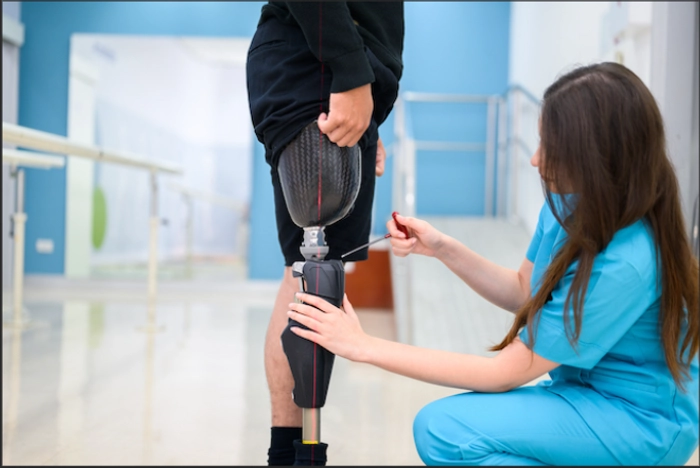Introduction
Choosing the right prosthetist is a crucial step in your journey towards regaining mobility and enhancing your quality of life after limb loss. At Dhyan Healthcare, we understand the importance of finding a prosthetist who can provide not only the technical expertise but also the emotional support needed during this significant transition. Here’s a comprehensive guide to help you choose the right prosthetist for your needs.
1. Understanding the Role of a Prosthetist
A prosthetist is a healthcare professional specializing in the design, fitting, and adjustment of prosthetic limbs. Their role is to ensure that your prosthetic limb fits comfortably, functions effectively, and meets your individual needs. A good prosthetist will work closely with you to achieve the best possible outcomes.
2. Qualifications and Certifications
Check Credentials:
- Ensure that the prosthetist is certified by a recognized professional body, such as the American Board for Certification in Orthotics, Prosthetics & Pedorthics (ABC) or the Board of Certification/Accreditation (BOC).
- Look for relevant educational qualifications and specialized training in prosthetics.
Experience Matters:
- Consider the prosthetist’s experience, particularly in handling cases similar to yours.
- An experienced prosthetist is more likely to have encountered a variety of challenges and developed effective solutions.
3. Personal Recommendations and Reviews
Ask for Recommendations:
- Seek recommendations from your healthcare provider, physical therapist, or other patients who have undergone prosthetic treatment.
- Personal experiences can provide valuable insights into the prosthetist’s competence and patient care.
Read Reviews:
- Look for online reviews and testimonials from other patients. Pay attention to feedback regarding the prosthetist’s communication skills, responsiveness, and overall satisfaction.
4. Initial Consultation
Schedule a Meeting:
- Arrange an initial consultation to meet the prosthetist in person. This is an opportunity to ask questions and assess their approach and expertise.
- Discuss your specific needs, lifestyle, and any concerns you may have about the prosthetic process.
Evaluate Communication:
- A good prosthetist should be a good listener, taking the time to understand your goals and expectations.
- Clear communication is essential for ensuring that you are comfortable and informed throughout the process.
5. Technological Expertise
Knowledge of Latest Technologies:
- Prosthetic technology is constantly evolving. Ensure that the prosthetist is up-to-date with the latest advancements and techniques.
- Ask about their experience with different types of prosthetic limbs, including myoelectric and bionic prosthetics.
Customization and Innovation:
- Inquire about the prosthetist’s ability to customize prosthetics to suit your specific needs. A one-size-fits-all approach is rarely effective.
- Look for a prosthetist who is willing to innovate and tailor solutions to enhance your comfort and functionality.
6. Support and Follow-Up Care
Ongoing Support:
- The relationship with your prosthetist doesn’t end once the prosthetic limb is fitted. Regular follow-ups and adjustments are crucial for long-term success.
- Ensure that the prosthetist offers comprehensive aftercare and is readily available to address any issues that may arise.
Multidisciplinary Approach:
- A good prosthetist will work collaboratively with other healthcare professionals, such as physical therapists and orthopedic surgeons, to provide holistic care.
- This team approach ensures that all aspects of your rehabilitation are addressed.
7. Accessibility and Convenience
Location and Accessibility:
- Consider the location of the prosthetist’s clinic and how easily you can access it for regular visits.
- Accessibility is important, especially in the early stages when frequent adjustments may be necessary.
Insurance and Costs:
- Check whether the prosthetist accepts your insurance plan and what costs are covered.
- Discuss any potential out-of-pocket expenses upfront to avoid surprises later.
Conclusion
Choosing the right prosthetist is a vital decision that can significantly impact your rehabilitation and quality of life. By considering qualifications, experience, recommendations, and personal comfort, you can find a prosthetist who will provide the support and expertise you need. At Dhyan Healthcare, we are committed to helping you every step of the way. For more information or to schedule a consultation, please visit our website or contact our clinic.


